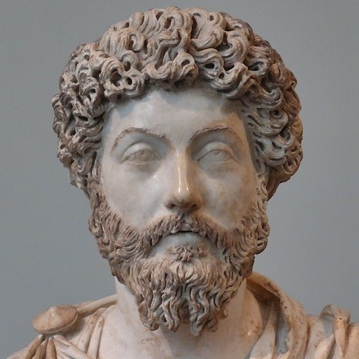Marcus Aurelius
You Have The Power Over Your Mind, Not Outside Events
The Meditations Of Marcus Aurelius
Marcus Aurelius - Introduction
Marcus Aurelius (121 – 180) was Roman emperor from 161 to 180 and a Stoic philosopher. His reign was marked by years of military conflict.
He practiced Stoicism and wrote about his own Stoic practice in a series of journals which he wrote solely for his own personal use.
Marcus Aurelius is widely regarded as one of history’s most exemplary leaders. Machiavelli referred to him as the last of the “Five Good Emperors.” He also described Marcus Aurelius as: “unassuming, a lover of justice, hater of cruelty, sympathetic and kind”.
Despite all of the benefits and privileges that he enjoyed as an Emperor, Marcus Aurelius had a tough time, he: “did not meet with the good fortune that he deserved, for he was not strong in body and was involved in a multitude of troubles throughout practically his entire reign.” [Cassius Dio]
But despite ill-health together with a troubled and extremely stressful life, Marcus Aurelius never gave in to self-pity or self-indulgence [common vices of Roman emperors], and throughout those ten long years of struggle as he was directing military campaigns, Marcus Aurelius produced twelve volumes of his private journals.
Trained in Stoic philosophy, Marcus Aurelius dedicated time almost every night to practicing a series of Stoic spiritual exercise which are reminders intended to help him train himself to humble, patient, empathetic, generous, and strong in the face of whatever adversity he was dealing with.
They have become one of the most influential philosophy books in the history of the world and have come to be known as: “The Meditations of Marcus Aurelius”.
Given that these journals were written and used solely for his own personal use and self-improvement, and were not intended to be read by anyone other than himself, the “Meditations” are a book of short sayings, rather like sutras, ranging from a couple of sentences to a paragraph. The journals were not written in any particular thematic sequence but rather a series of self-reminders or admonishments as a form of stoic practise and an on-going exercise in self-improvement.
The same themes recur again and again and illustrate how Stoic journaling practise is based on self-examination, reflection and repetition.
"Meditations" is a most extraordinary document - perhaps one of a kind. This is the most private thoughts of the world’s most powerful man, at that time, giving advice to himself on how to do the best job possible in delivering onerous demands, responsibilities and obligations of his position.
“Meditations” is a personal work- book of actionable advice based on stoic teachings which Marcus Aurelius practiced and used. It is very readable and accessible and you will read this book and come away with a phrase or a line that will resonate with you and help you the next time you are experiencing difficulties.
The purpose of this site is to show you how to cope in tough times, and to provide you with the tools to do this successfully.
The teachings, quotations, reflections and observations of Marcus Aurelius are especially relevant as at time of writing in early 2021 the world slowly emerges from post Covid-19 lockdown and starts to come to terms with the societal, economic and financial consequences.
This is practical, actionable philosophy!
The Meditations Of Marcus Aurelius
Below are five some of the major themes that recur throughout the book.
[1] Accept and live in accordance with the inter-connectedness of all things
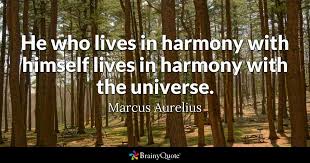
The concept of connectedness, and the whole, flows throughout the “Meditations”. In common with all the Stoics, Marcus Aurelius believed that we are part of an inner-connected organism.
“Always remember these things: what the nature of the Whole is, what my own nature is, the relation of this nature to that, what kind of part it is of what kind of Whole, and that there is no one who can prevent you keeping all that you say and do in accordance with that nature, of which you are a part.”
- You should not be upset by the misdeeds of others, correct them if possible, but if they are stubborn and will not change, accept it.
- In your response to these difficult people, you must never allow your own principles to be violated.
- You should not be surprised by the bad deeds of others, and it is pointless to wish for it to be otherwise.
- People do bad things out of ignorance of what is good and evil, and you should forgive them because of their ignorance.
- People are social animals and meant to live in harmony.
“He who sees the present has seen all things, both all that has come to pass from everlasting and all that will be for eternity: all things are related and the same.
You should meditate often on the connection of all things in the universe and their relationship to each other.
In a way all things are interwoven and therefore have a family feeling for each other: one thing follows another in due order through the tension of movement, the common spirit inspiring them, and the unity of all being.”
[2] Avoid the
pursuit of pleasure, fame and the approval of others
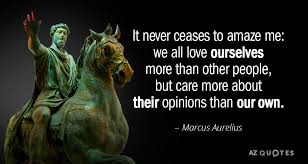
- Marcus Aurelius repeatedly explained why the pursuit of fame and praise is foolish.
- He points out that so many famous men have been forgotten
- He explains that there are no immortal actions:
“Consider that as the heaps of sand piled on one another hide the former sands, so in life the events which go before are soon covered by those which come after.”
- Fame will always fade into oblivion and pursuit of it merely demonstrates one’s vanity.
- Nothing is made better by praise, the beauty of things comes from the thing itself and not what people say about it.
- To think then that you are gaining something by being praised is a mistake.
“When you’ve done well and another has benefited by it, why like a fool do you look for a third thing on top— credit for the good deed or a favor in return?”
- The person with strong desires is ignoring the well-being of others because they want something more than they want to be virtuous.
[3] The Acceptance of Death and Living In A Universe Of Change
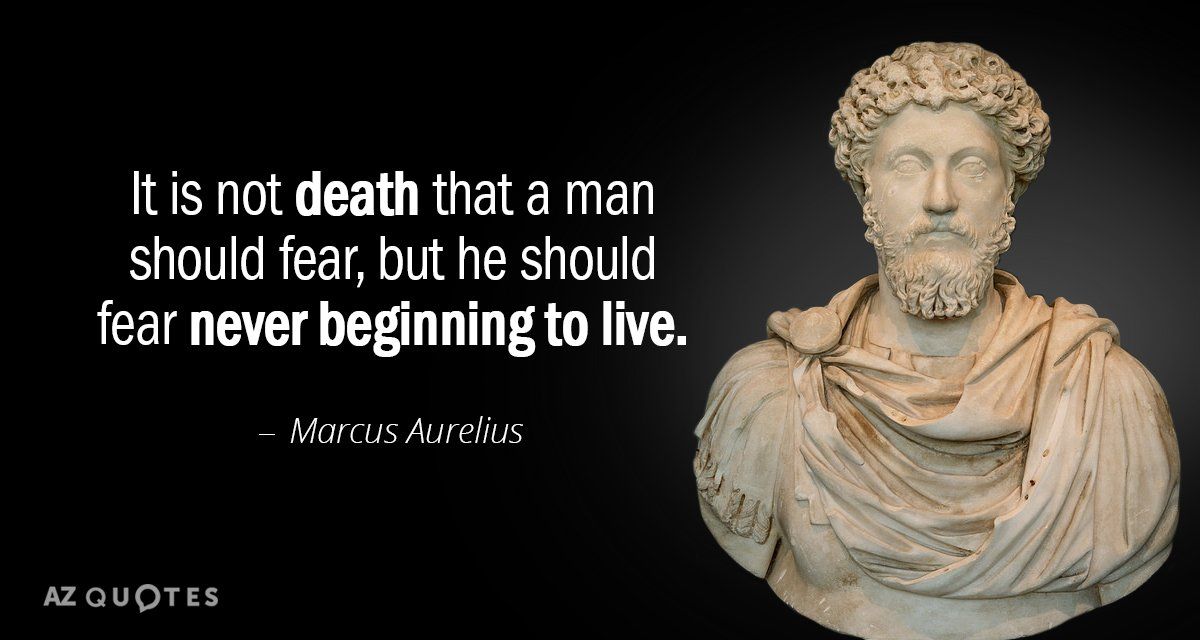
- Marcus Aurelius speaks strongly on the eternally changing nature of the universe and the acceptance of death.
- He reminds us that all of us will die, however, we only ever lose the present moment because that is all we ever have.
- He also reminds us that we could die at any moment and to live to the fullest while we still can.
“Not to live as if
you had endless years ahead of you. Death overshadows you. While you’re alive
and able — be good.”
[4] It is your response to events that creates the outcomes that you experience
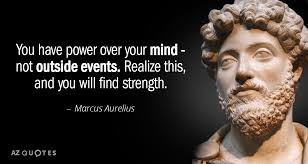
- Our perceptions of events as troublesome are the real source of any unhappiness we experience, not the events themselves.
- Marcus Aurelius believed that a person could immediately wipe any upsetting impressions from their mind and be at peace.
- He also recommended remembering the following whenever we experience anxiety:
“Let not future things disturb you, for you will come to them, if it shall be necessary, having with you the same reason which you now use for present things.”
- If we don’t let events make us worse people, we are never truly harmed by them.
“Choose not to be harmed — and you won’t feel
harmed. Don’t feel harmed — and you haven’t been.”
“Our actions may be impeded . . . but there can be no impeding our intentions or dispositions. Because we can accommodate and adapt. The mind adapts and converts to its own purposes the obstacle to our acting.”
“The impediment to action advances action. What stands in the way becomes the way.”
[5] Your Rational Mind is Your Greatest Asset
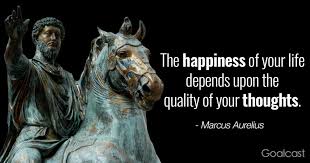
- Your ability to reason is what sets you apart from the animals and is an important power that you must use to the fullest.
- Reason could be used to understand the universal reason present in nature, which would lead to agreement with it even if events seemed harmful.
- Our rational minds have complete power over our opinions and the mind only experiences suffering when it itself creates a desire for a specific outcome in life.
- Your mind cannot be affected by events unless it makes itself be affected.
- Every appearance is the result of what the mind wills it to appear to be and the mind makes itself exactly what it is.
“You have power over your mind – not outside events. Realize this, and you will find strength.”
Resources
Ryan Holiday:
100 Things I Learned in 10 Years and 100 Reads of Marcus Aurelius’s Meditations
Massimo Pigliucci:
Marcus Aurelius – the Unemotional Stoic?
How Does Marcus Aurelius Align With The Themes Of This Site?
Here are a number of touch points
- The Stoics
- Seneca
- Epictetus
- Massimo Pigliucci
- The Practice Of Mindfulness
- This Too Shall Pass
- Thinking Skills
- The Stockdale Paradox
- You Are Not Your Thoughts
- First Principles Thinking
Return to: The Stoics
Return to: Inspirational People
LATEST ARTICLES
The Inner Weight of Shame - Sustained By Attentional Fixation
 A Mind That Is Continuously Engaged In Self-Surveillance. Shame is one of the heaviest inner burdens a human being can carry. It does not announce itself loudly or demand attention through drama. Inst…
A Mind That Is Continuously Engaged In Self-Surveillance. Shame is one of the heaviest inner burdens a human being can carry. It does not announce itself loudly or demand attention through drama. Inst…Does Prayer Work? The Psychology of Prayer, Meditation and Outcomes
 Reality Is A Complex System Of Countless Interactions - Including Yours. So does prayer work? The problem is that the question itself is usually framed in a way that guarantees confusion. We tend to a…
Reality Is A Complex System Of Countless Interactions - Including Yours. So does prayer work? The problem is that the question itself is usually framed in a way that guarantees confusion. We tend to a…Living in Survival Mode Without Surrendering Mental Authority
Living in Survival Mode Without Surrendering Mental Authority
 Clear Thinking When You’re Just Trying to Stay Afloat. Many people today are overwhelmed because they are living in survival mode - not temporarily, but as a persistent condition of life. For many, th…
Clear Thinking When You’re Just Trying to Stay Afloat. Many people today are overwhelmed because they are living in survival mode - not temporarily, but as a persistent condition of life. For many, th…Manifestation Without Magic: A Practical Model
 Manifestation without magic is not a softer or more intellectual version of popular manifestation culture. It is a different model altogether. Popular manifestation teachings tend to frame reality as…
Manifestation without magic is not a softer or more intellectual version of popular manifestation culture. It is a different model altogether. Popular manifestation teachings tend to frame reality as…Staying Committed When You Can't See Progress - The Psychology of Grit
 Uncertainty Is Not The Absence Of Progress, Only The Absence Of Reassurance. One of the most destabilising experiences in modern life is not failure, but uncertainty and staying committed when you can…
Uncertainty Is Not The Absence Of Progress, Only The Absence Of Reassurance. One of the most destabilising experiences in modern life is not failure, but uncertainty and staying committed when you can…The Battle For Your Mind - How To Win Inner Freedom In A Digital Age Of Distraction
 From External Events to Inner Events. We often think of “events” as things that happen out there: the traffic jam, the rude comment, the delayed email reply. But what truly shapes our experience is wh…
From External Events to Inner Events. We often think of “events” as things that happen out there: the traffic jam, the rude comment, the delayed email reply. But what truly shapes our experience is wh…How to See Your Thoughts Without Becoming the Story
 A Practical Guide to Thought-Awareness. You can spend your life inside the stories of your mind without ever learning how to see your thoughts clearly and objectively. Most of the stuff we tell oursel…
A Practical Guide to Thought-Awareness. You can spend your life inside the stories of your mind without ever learning how to see your thoughts clearly and objectively. Most of the stuff we tell oursel…The Collison Decision Matrix - A Simple Framework for Better Choices
 The Collison Decision Matrix Is A Practical Everyday Thinking Tool. Most of us spend a surprising amount of time worrying about decisions. From small ones such as what to wear, what to eat, what to te…
The Collison Decision Matrix Is A Practical Everyday Thinking Tool. Most of us spend a surprising amount of time worrying about decisions. From small ones such as what to wear, what to eat, what to te…The Power Of Asking The Right Question
 The Power Of Asking The Right Question Lies In The Quest For Insight. To experience the power of asking the right question you must develop the practice of asking questions. The best way to improve th…
The Power Of Asking The Right Question Lies In The Quest For Insight. To experience the power of asking the right question you must develop the practice of asking questions. The best way to improve th…Site Pathways
 Here is a site pathway to help new readers of Zen-Tools navigate the material on this site. Each pathway is based around one of the many key themes covered on this site and contain a 150 word introduc…
Here is a site pathway to help new readers of Zen-Tools navigate the material on this site. Each pathway is based around one of the many key themes covered on this site and contain a 150 word introduc…How To Live With Contradiction - Beyond Thought Let Stillness Speak
 A major impact on so many peoples' lives is the situational contradiction of unfilled realistic expectations. So where does all this leave us? Well here we are, with mental equipment that is more lim…
A major impact on so many peoples' lives is the situational contradiction of unfilled realistic expectations. So where does all this leave us? Well here we are, with mental equipment that is more lim…
